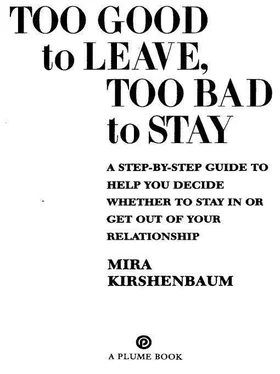Kirshenbaum, Mira - Too Good to Leave, Too Bad to Stay
Здесь есть возможность читать онлайн «Kirshenbaum, Mira - Too Good to Leave, Too Bad to Stay» весь текст электронной книги совершенно бесплатно (целиком полную версию без сокращений). В некоторых случаях можно слушать аудио, скачать через торрент в формате fb2 и присутствует краткое содержание. Жанр: Психология. Описание произведения, (предисловие) а так же отзывы посетителей доступны на портале библиотеки ЛибКат.
- Название:Too Good to Leave, Too Bad to Stay
- Автор:
- Жанр:
- Год:неизвестен
- ISBN:нет данных
- Рейтинг книги:3 / 5. Голосов: 1
-
Избранное:Добавить в избранное
- Отзывы:
-
Ваша оценка:
- 60
- 1
- 2
- 3
- 4
- 5
Too Good to Leave, Too Bad to Stay: краткое содержание, описание и аннотация
Предлагаем к чтению аннотацию, описание, краткое содержание или предисловие (зависит от того, что написал сам автор книги «Too Good to Leave, Too Bad to Stay»). Если вы не нашли необходимую информацию о книге — напишите в комментариях, мы постараемся отыскать её.
Too Good to Leave, Too Bad to Stay — читать онлайн бесплатно полную книгу (весь текст) целиком
Ниже представлен текст книги, разбитый по страницам. Система сохранения места последней прочитанной страницы, позволяет с удобством читать онлайн бесплатно книгу «Too Good to Leave, Too Bad to Stay», без необходимости каждый раз заново искать на чём Вы остановились. Поставьте закладку, и сможете в любой момент перейти на страницу, на которой закончили чтение.
Интервал:
Закладка:
Matt’s Story
It was a classic tale of two people meeting in college, falling in love, and getting married after graduation. Wendy and Matt originally got involved with each other because they were part of the same group of friends and because they liked, and more important, disliked, the same kinds of music. They felt comfortable with each other, and once they started saying they loved each other they felt it and it seemed impossible not to get married.
Things were great for a while, particularly with Matt earning a good salary as an electronics technician for a local defense contractor and with Wendy working as a middle-school teacher. Then they turned a comer.
It’s a mystery, I think, exactly when and how things go wrong in a relationship like theirs that starts out with a lot going for it.
This mystery’s maintained by the fact that people like this rarely seek help when things start going wrong, so that by the time hurts and resentments have grown, the seed that began it all has been deeply buried.
By the time they went to someone for help, Matt in particular was convinced that he and Wendy had grown in very different directions and he just didn’t feel there was much connection between them.
He saw himself as a guy who was interested in the larger world of politics and social trends. From his point of view, after the kids came and Wendy stopped teaching, she seemed almost completely absorbed in the minutiae of family life. Besides, Matt had noticed a trend in the first couple of years they were married : the madcap college kid Wendy had started out as was getting tough and serious and all-too grown-up. Having kids didn’t soften this; it speeded it up. Wendy just didn’t seem to him the sweetheart she used to be.
What it all added up to for Matt was that compared to what he’d been looking forward to his marriage had turned into a very iffy relationship. He kept staying, but he kept thinking about leaving.
Then his best friend got divorced. It seemed miraculous to Matt the ease with which his friend “won his freedom.” Why stay bound to a nagging sourpuss, Matt wondered, when the freedom he’d missed out on could still be his? There was a simple equation in his mind: leaving equals freedom. Oh, boy! Staggering toward that oasis, or mirage, of freedom, Matt got divorced himself.
What did he find “out there” that he might have seen before he got divorced if he’d looked more carefully?
Do you remember the very last shot in the Truffaut movie The Four Hundred Blows? The kid who’d spent the movie running away from home and reform school finally got to the ocean he’d been seeking. And when he saw it for the first time he froze with a sad, blank expression on his face because where he’d been expecting everything he found nothing.
That’s what happened to Matt. Being single just wasn’t so great. The amusement park of single life turned out to be a barren strip of loneliness, a lifestyle filled with incredible difficulty at meeting new people, awkward dates with women he couldn’t connect to, and the cruel realization that the young women he’d been fantasizing about getting together with considered him too old.
And he missed his kids. He’d thought he’d have these wonderful weekend experiences of pure parenting pleasure, divorced from the hassles of getting kids off to school on time and making sure they do their homework. Instead, the weekends were night-mares of boredom and disconnection, filled with the frustration of trying to amuse kids whose friends and lives were elsewhere.
To cap it all off, when he finally did get into some kind of semicommitted, semi-long-term relationship, he found that that woman, once she felt she could take Matt a little for granted, ended up being just as demanding and businesslike as Wendy had been.
Here’s Matt’s judgment on himself. “You just can’t compare a reality to a dream, and that’s what I’d tried to do. Of course my reality couldn’t compete with my dream. But if instead I’d compared my reality to the real alternative that was waiting for me, I wouldn’t have left. My life with Wendy was far from perfect, but there was nothing about it that meant I couldn’t stay or that I wouldn’t have been happy staying and working things out.”
Matt’s case is a perfect example of the enormous difference it makes when you move from tunnel vision to a broader, more realistic perspective in trying to sort out whether it’s best to leave or stay.
For Matt, tunnel vision led to a mistaken decision to leave. It can just as easily lead to a mistaken decision to stay.
Donna’s Story
For many years Donna’s life with Margot was a gilded cage of her own making. Donna supplied the cage, Margot supplied the gilding. When they’d first started out they’d both lived the life of counter-culture-type people without much money. But very soon Margot started getting into computers and with the help of what Donna eventually realized were extremely rich relatives, Margot started building what turned into a highly successful company manufacturing specialized computer devices for the financial world.
While all of this splendor was in the making, Donna chugged along, dilettantishly dabbling in one nonremunerative area after another, from making harpsichords to counseling inner-city youth. Meanwhile her relationship with Margot was getting more and more iffy. There was a loosely connected spectrum of problems starting with their having less and less in common at one end of the spectrum, through Donna’s having problems feeling intimate with Margot (particularly with Margot’s being increasingly preoccupied with business and money), down to their lovemaking being rare and cold at the other end of the spectrum.
Besides the fact that she still had some feelings of love for Margot, money made the whole situation confusing for Donna. To put it bluntly, here were her alternatives, as she saw them at the time through the tunnel vision of relationship ambivalence.
On the one hand, there was a life of comfort and prosperity if she stayed with Margot. Not only would there be more than enough money for Donna to do pretty much whatever she wanted, but Donna felt she’d indirectly helped Margot get the business going and so felt an emotional stake in it. Tantalizingly, there was a strong possibility that with a combination of Margot’s wealthy relatives dying and/or some giant corporation buying out her business she (and by extension Donna) would end up not only prosperous but seriously rich.
On the other hand, Donna was convinced that leaving Margot meant a life of desperate poverty. With no money of her own she’d soon be as poor as the young women she’d been counseling. At least that was her fear.
So she was miserable, but she stayed for years, blinded by the gilding on her cage. Then by chance she had an experience that opened her eyes. She got involved with trying to find a place to live for an eighteen-year-old woman she’d been working with. Talking to friends and acquaintances she discovered opportunities for sharing houses and apartments that were cheap, safe, and comfortable. It suddenly dawned on her that if she switched to working full time as she’d frequently been invited to do, she’d be able to afford a perfectly decent life on her own, supporting herself.
She was filled with regret at the thought of how she could have changed her life years and years earlier if only she’d seen past her fears to her real possibilities.
Look Both Ways
Matt’s story and Donna’s story illustrate the opposite ways tunnel vision can lead to disaster. If Matt had opened his eyes more widely, he would have seen that his iffy relationship was really too good to leave. If Donna had opened her eyes more widely, she would have seen that her iffy relationship was really too bad to stay in. It’s not that opening their eyes changed any of the realities they’d already been aware of. But they would have put them in a completely fresh perspective.
Читать дальшеИнтервал:
Закладка:
Похожие книги на «Too Good to Leave, Too Bad to Stay»
Представляем Вашему вниманию похожие книги на «Too Good to Leave, Too Bad to Stay» списком для выбора. Мы отобрали схожую по названию и смыслу литературу в надежде предоставить читателям больше вариантов отыскать новые, интересные, ещё непрочитанные произведения.
Обсуждение, отзывы о книге «Too Good to Leave, Too Bad to Stay» и просто собственные мнения читателей. Оставьте ваши комментарии, напишите, что Вы думаете о произведении, его смысле или главных героях. Укажите что конкретно понравилось, а что нет, и почему Вы так считаете.












